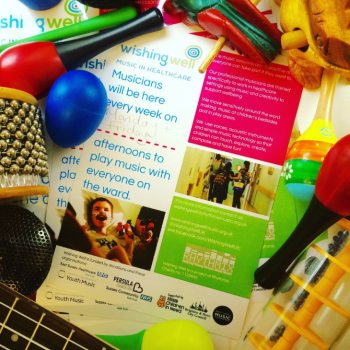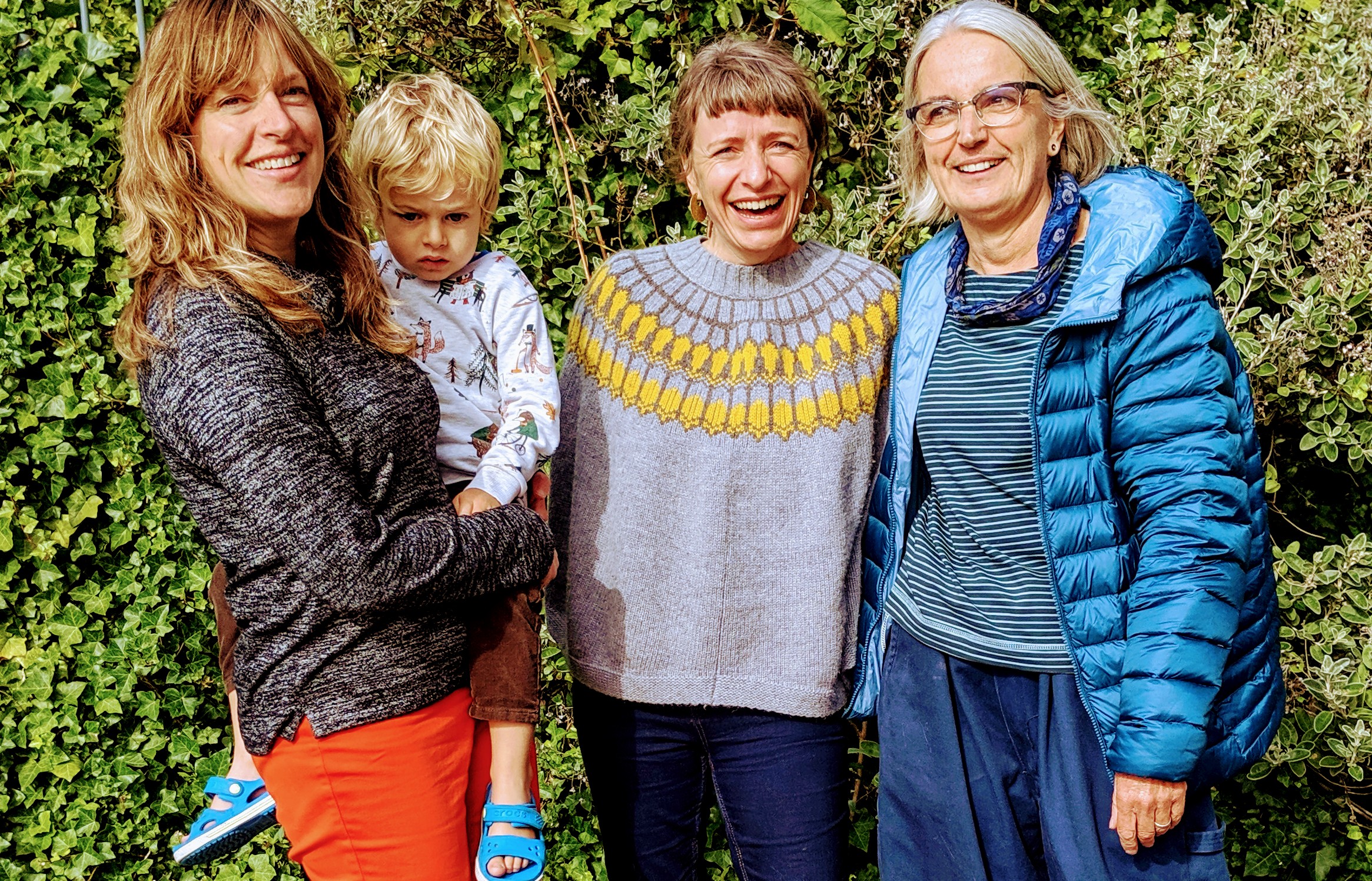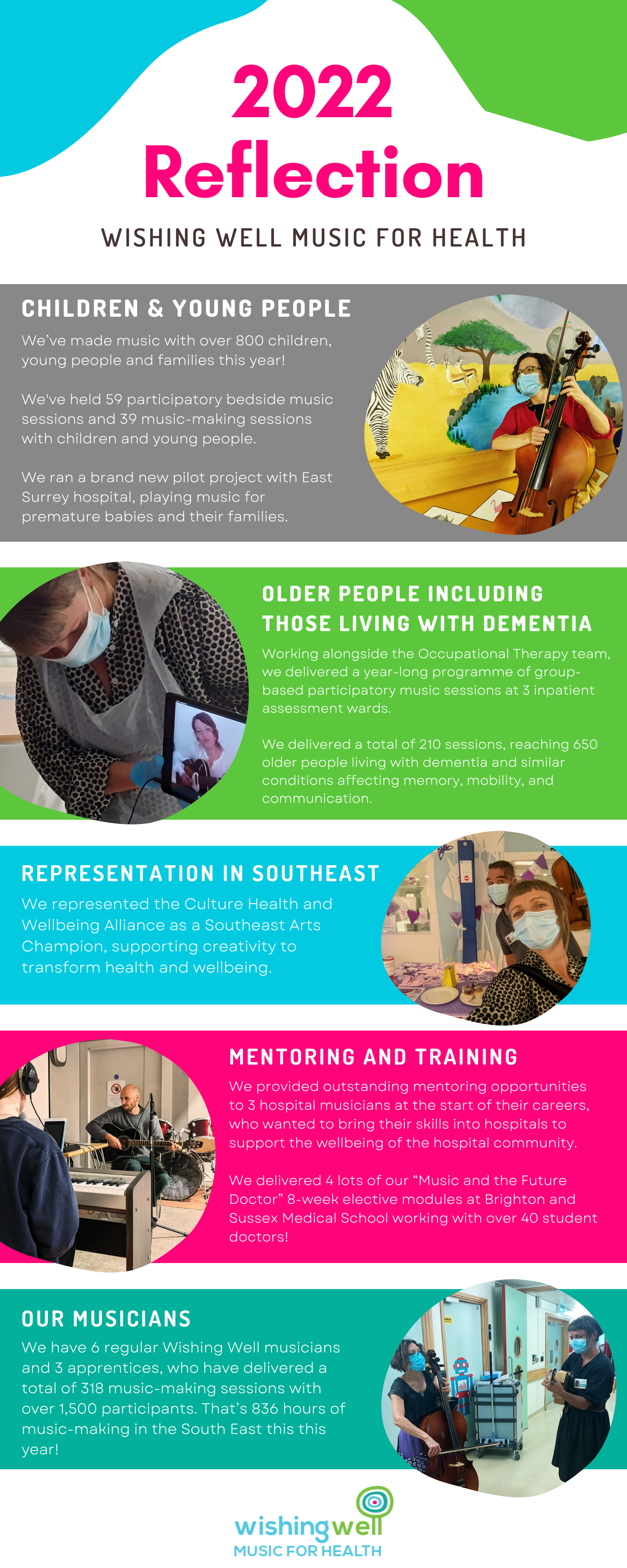News & Blog
 I really enjoyed the rewarding nature of working as a musician in the hospital. Every session was new and I would come away feeling a sense of pride, hoping that I made any bit of difference to the children or parents that I’d seen that day. Music is such a powerful tool that can both bring out different emotions in people but also completely takes you out of the world for a small amount of time. This is why I love music so much, it stops the busy ‘chattering’ in my mind and allows me to feel instantly calm. Nothing else matters at that moment.
I really enjoyed the rewarding nature of working as a musician in the hospital. Every session was new and I would come away feeling a sense of pride, hoping that I made any bit of difference to the children or parents that I’d seen that day. Music is such a powerful tool that can both bring out different emotions in people but also completely takes you out of the world for a small amount of time. This is why I love music so much, it stops the busy ‘chattering’ in my mind and allows me to feel instantly calm. Nothing else matters at that moment.
All of the children I saw at the Royal Alexandra Children’s Hospital were very young so it was sometimes hard to tell if the music made a difference to them, but then on occasions, the children were dancing and playing instruments with us with a smile on their faces, uplifted by the music. These were such lovely moments to experience! The parents were so grateful, saying things like “Thank you so much! He’s loving it!” and would dance with them with big smiles across the child and parents’ faces. It was lovely seeing the staff smile and dance along as we passed through the corridors, playing nursery rhymes and songs that they knew.
I met little children with so much medical equipment (oxygen masks, wires, etc), which was sad to see, and a couple of times babies were desperately trying to take all of the equipment off. We tried our best to comfort and distract the babies and parents in a situation like this with music. I was shocked to see this because I had never been to a hospital and seen this level of equipment before, but I soon adjusted. By the second session, I felt completely comfortable and Marina (my mentor) and I spoke about everything we’d experienced after each session which was really useful.
Seeing the sadness and worry of the parents in the ward, I couldn’t imagine what it would feel like to be them. It really put things into perspective and made me want to make an impact in any way possible. Sharing music with the children and families was my way to do that.
It’s been a beautifully busy year for our incredible Wishing Well musicians, who have been making music with families and their babies, young people, older people and people living with dementia.
We are so grateful that this year we have been able to work face-to-face with our participants for the entire year. COVID is still very much present in hospitals, but restrictions are slowly easing. We are still wearing masks, but we have also been able to hold a hand, dance and play musical instruments together again – this has been a joy!
2022 was the year we became a registered charity, put our 3 year strategy in place and talked to our hospital partners about the ever growing need for music making to make life better for our hospital communities..
Our Wishing Well family grew this year! We welcomed a comms assistant, a fundraiser and a fourth Trustee to our Board.
We have exciting plans for 2023. More on that to come…
Here are some of the things we’ve been up to in 2022:
We are beyond grateful for all the support we have received. It means we are able to bring so magical musical joy to people in healthcare settings for another year!
 Working alongside Jack at Chalk Hill for Wishing Well’s apprenticeship programme has been a truly incredible experience. The opportunity to connect with young people through music has been deeply rewarding and insightful both on a personal and professional level.
Working alongside Jack at Chalk Hill for Wishing Well’s apprenticeship programme has been a truly incredible experience. The opportunity to connect with young people through music has been deeply rewarding and insightful both on a personal and professional level.
With the focus of the sessions being on music making, the scheme empowered me to exercise and progress my production and songwriting skills, with the aim of ensuring the space felt positive and judgment-free. Watching the young people at Chalk Hill develop and become more confident as the weeks went on was both thrilling and contagious! We wrote some serious hits! It was a huge highlight to be involved in the encouragement of their songcraft and creativity, as well as enabling the space for them to express themselves. Many were outstandingly gifted and own real musical as well as artistic potential, and watching that self-discovery strengthen and grow over the sessions was astonishing.
Writing music has been a mode of therapy for me for years, and it feels so special to be a part of the realisation for others too. The support, encouragement and guidance Wishing Well provided before, during, and after the scheme has made for an invaluable few months.
On a personal level, the scheme has solidified so much for me and my future. My ambition and passion to explore and engage in community music projects have become even more ignited, and I feel very lucky to have had the opportunity to build a solid foundation of experience thanks to the apprenticeship.
If you are considering the Wishing Well apprenticeship, I could not recommend it more. You will be immersed in an experience which will most likely change your life, and even better, others’ lives.
I am sad for the programme to be over, but I am excited at the prospect of future community music projects. To everyone at Wishing Well & Chalk Hill, thank you. You have fuelled a fire in me that I’m sure will now forever burn!
As part of our work in children’s healthcare settings in Sussex, we offer training and apprenticeships to emerging music facilitators who want to bring their skills into hospitals to support the wellbeing of the hospital community. Its been a joy working with 22-year-old fiddle player, Raph kent who joined us at The Alex last Autumn. If you’re a Musician under 25 years of age and want to get involved in our programme, we’d love to hear from you! Email [email protected].
Here’s Raph:
In June 2021, I had the chance to take part in a training programme with Wishing Well Music for Health, as a mentee healthcare musician at the Royal Alexandra Children’s Hospital in Brighton. Before hearing about the organisation from a friend, I thought the only way that music and healthcare might overlap was in music therapy. I never knew musicians could go into many different hospital settings and provide musical experiences centered around the patients’ need, in that moment.
Having spent time in hospital myself as a teenager, I had never come across a healthcare musician, but on reflection, I have thought about how I would have found it a refreshing experience, a holistic intervention in the clinical environment that is “hospital”. Having the chance to experience this role has really given me an insight into the ways music can simultaneously affect people’s physical, emotional and spiritual states in a way that shows how music has an important place in healthcare, especially for those in times of crisis.
During my time at The Alex, I had the chance to see a few encounters between children, parents, and carers facilitated by music that were really special. A particular encounter I remember was with a 10-year-old girl who had quite complex needs. She was nonverbal but extremely expressive through facial expressions and sounds. She was very responsive to the violin and she would close her eyes and move her head with the music, joining in with sounds and clicking. I had never seen somebody experience music in such an authentic way and found it particularly moving. Her carer had expressed that she loved the violin and it was very evident as soon as she saw the instrument!
Over the 10 week programme, there were some children who were on the ward for weeks at a time, meaning we had a few sessions with familiar faces. I found it interesting to see children more than once as it was a different experience each time, highlighting the much-needed adaptability of a healthcare musician. Amy, the musician I was working with, took the lead with matching the mood of the room. One week we met a mother of a 7-year-old girl who was just about to have surgery. She was very worried as her daughter was distressed and in pain. Amy and I played the theme of ‘Moana’ softly at the door, allowing space for the girl and her mum to be together, but not alone in their experience.
A week later we came on to the ward to see the little girl sitting up in bed and smiling, with her mum and grandma beside her. I followed Amy’s lead again as we approached in a different way to the week before, playing the same tunes but with a tone that reflected the family’s relief. Her mum thanked us for the 2 times we played for them and it was lovely to see that they remembered us from the week before.
The hospital staff at the Alex were always welcoming to me, and it is clear that the Wishing Well team make a valuable difference in the hospital, both to patients and to staff. This mentor programme was a wonderful experience and a great glimpse into what it takes to be a healthcare musician!
 Mentor Programme
Mentor Programme
As part of our Youth Music funded programme in children and young people’s healthcare settings, we’re excited to offer places on our Mentor Programme throughout 2022-23. Successful applicants will work alongside the Wishing Well team in one of our partner hospitals for 10 weeks, receiving additional support and training before and after their project. This is a paid opportunity to gain experience working with children, young people and families in acute healthcare and to acquire skills which are transferable to all aspects of a music-based portfolio career.
This is a rolling programme throughout 2022/23. To find out more, please email [email protected]
Criteria for Mentees
You’ll need:
-to be 25 years of age or under, during your placement with us
-to have some experience/training in musical leadership in community settings
-this is a paid opportunity so you need to be registered as self employed and have public liability insurance in place (we can help you with both of those things if needed)
-to have a keen interest in bringing your music into acute healthcare settings, using your skills to support the wellbeing of the hospital community through connection, empowerment and expression.
-to be a good communicator and be keen to develope a “reflective” practice.
-to be available for a 10-week placement at one of our 2 partner hospitals in Haywards Health (mid Sussex) or Brighton. (sessions are 2 hours long on a set day each week).
Placements:
Chalk Hill, an in-patient CAMHs (child and adolescent mental health) ward in Haywards Heath (mid Sussex), supporting our resident musician with one-to-one and small group sessions involving multi-instrumental work, composition, songwriting and production.
The Royal Alexandra Children’s Hospital, Brighton. Bedside music-making in children’s critical care and medical wards. Appropriate children’s repertoire, confidence with singing and percussion essential.
Note that we have to wear masks at both of these settings – we are allowed to sing but not to use mouth blown instruments.
This is a rolling programme throughout 2022/23. To register your interest in the programme, please email [email protected]
We’re looking forward to hearing from you!
There’s been a lot of change for us over the summer but we are over the moon to share our news with you!!
Wishing Well has just launched as a brand new Community Interest Company! Meet our 3 Directors: Marie Benton, CEO of Choir with No Name, Janet Lee, Children’s Critical Care Practitioner at The Royal Alex in Brighton and Jo White who has been with the programme since it’s creation. We are committed to continuing Wishing Well’s work; bringing the joy of music-making right to the heart of healthcare to enrich the lives of people young and old while they are in hospital. Tricky times are when we turn to the arts to help us express how we feel, connect with others and uplift ourselves. We’re going to make sure that people and their families, spending long days and weeks in hospital get to do just that.
